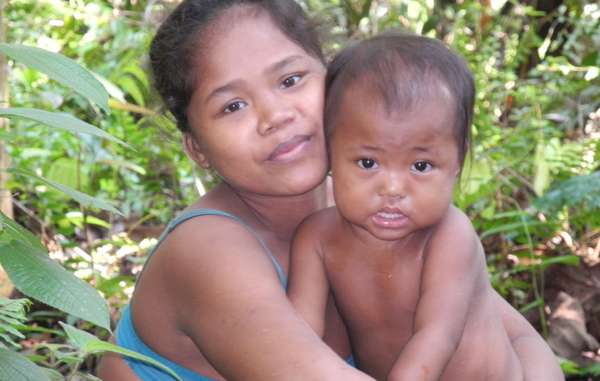
by Deep Green Resistance News Service | Jun 27, 2016 | Colonialism & Conquest
Featured Image: The Orang Rimba have lived in the forests of Sumatra for generations, but now they are under threat. © Survival International
By Survival International
Members of the nomadic Orang Rimba tribe in Indonesia have been attacked and their possessions burned as part of an eviction from a palm oil plantation on their ancestral land.
The Orang Rimba are a nomadic hunter-gatherer tribe who have been dependent on and managed their forest home in Sumatra for generations. Although a national park was created to protect local wildlife and – unprecedented in Indonesia – the tribe, the Indonesian government has signed over most of their ancestral lands to palm oil, timber and other plantation companies.
As a result many Orang Rimba are forced to live in plantations, collecting palm oil seeds and hunting wild boar. For collecting the seeds, the tribe have been accused of theft by the company operating in the area, even though the oil palm is on Orang Rimba ancestral land and the tribe do not regard such foraging as theft.
One Orang Rimba man said: “That is our ancestral land. Our life and death are in that land. How can it be that we are forbidden? It’s forbidden for children to take the seeds which have fallen from the palm oil trees. How can it be forbidden? They planted palm oil trees all over our land.”
The palm oil company PT Bahana Karya Semestra (BKS), which is owned by Sinar Mas, has recently ordered the Orang Rimba to leave. Members of the tribe have reported that they were already preparing to go when they were attacked, beaten and stabbed by security staff from BKS.
Security staff then set fire to their shelters, vehicles and hundreds of loin cloths. According to custom, these are regarded as the tribespeople’s most precious possessions. They represent wealth and prestige and are used to pay fines in Orang Rimba customary law.
The Orang Rimba’s land and resources are being stolen, and they are being subjected to violence in the name of ‘’progress.’’ Survival International, the global movement for tribal peoples rights, is calling for the Orang Rimba’s right to their ancestral lands to be recognized.
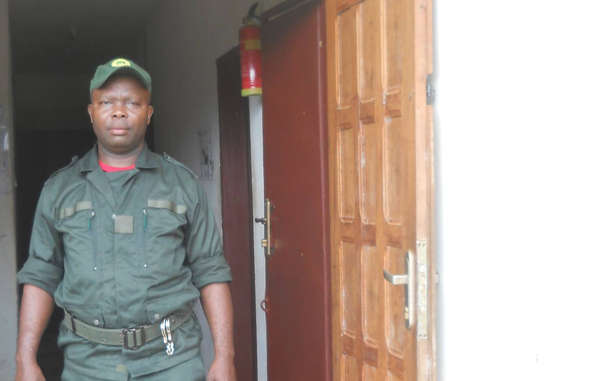
by Deep Green Resistance News Service | Jun 14, 2016 | Biodiversity & Habitat Destruction
Featured image: Cameroonian “ecoguard” Mpaé Désiré, who in 2015 was accused of beating Baka and in 2016 was arrested for involvement in the illegal wildlife trade. © Facebook
A new UN report has confirmed that corrupt officials are at the heart of wildlife crime in many parts of the world, rather than terrorist groups or tribal peoples who hunt to feed their families.
The reports’ findings have coincided with a wave of arrests of wildlife officials across Africa and Asia, raising concerns of a global “epidemic” of poaching and corruption among armed wildlife guards who are supposed to be protecting endangered species.
Recent conservation corruption arrests include:
-A wildlife guard in Cameroon, Mpaé Désiré, and a local police chief who were arrested on suspicion of involvement in the illegal ivory trade on the ancestral land of the Baka “Pygmies” and other rainforest tribes. Mr Mpaé has been accused by Baka of beating up tribespeople and torching one of their forest camps after accusing them of poaching.
The World Wildlife Fund (WWF) has been funding wildlife guards in this part of Cameroon since at least 2000, despite reports of guards arresting, beating and torturing tribal hunters.
One Baka man told Survival in 2013: “Ecoguards used to open tins of sardines and leave them as bait to attract leopards, so they could hunt them for their skins.”
Another said: “The ecoguards don’t want anyone in the forest at all so that no one hears the gunshots as they poach.”
Elsewhere:
– Four park employees in India have been arrested for involvement in poaching endangered one-horned rhinos in the notorious Kaziranga reserve, where wildlife guards are encouraged to shoot on sight anyone they suspect of poaching. 62 people have been killed there in just nine years.
– A forest officer has been arrested near Kaziranga after police found a tiger skin and ivory in his house.
– In the Pench tiger reserve in central India, a guard, named in reports as Vipin Varmiya, has been arrested for killing a tiger and her two cubs.

A tiger was allegedly killed by a park guard in Pench tiger reserve, India © Survival International
A recent Brookings Institution Report confirmed that the big conservation organizations are failing to tackle the true poachers – criminals conspiring with corrupt officials. The link between corruption and wildlife crime has also been reported in Tanzania, South Africa, Kenya, Zimbabwe, Uganda and Indonesia.
The involvement of armed guards in poaching, in countries where militarized conservation tactics are employed, raises questions over the advisability of using violence and intimidation to protect flora and fauna. In many parts of the world, armed conservation has led to violence against local tribal peoples, including in Cameroon, and in India where summary execution in the name of conservation is in danger of becoming more widespread.
In February 2016, Survival filed an OECD complaint against the World Wildlife Fund (WWF) for its involvement in funding repressive and often violent conservation projects in southeast Cameroon, rather than tackling the real poachers. Persecuting the environment’s best allies in place of real action to tackle these systemic problems is harming conservation.
Survival’s Director Stephen Corry said: “Conservation’s response to poaching has been to accuse local tribespeople when they hunt to feed their families, to support the use of shoot-to-kill policies and to blame terrorists. None of it works; it’s harming conservation. The true poachers are the criminals, including ecoguards, who conspire with corrupt officials. As the big conservation organizations partner with industry and tourism, they’re harming the environment’s best allies, the tribal peoples who have been dependent on and managed their environments for millennia. Tribespeople should be at the forefront of the environmental movement, they know who the poachers actually are, they can protect their land from logging, they protect biodiversity, and are better at looking after their environment than anyone else.”
Notes: Latest reports indicate Mr Mpaé has been released from custody and is awaiting trial.
“Pygmy” is an umbrella term commonly used to refer to the hunter-gatherer peoples of the Congo Basin and elsewhere in Central Africa. The word is considered pejorative and avoided by some tribespeople, but used by others as a convenient and easily recognized way of describing themselves.
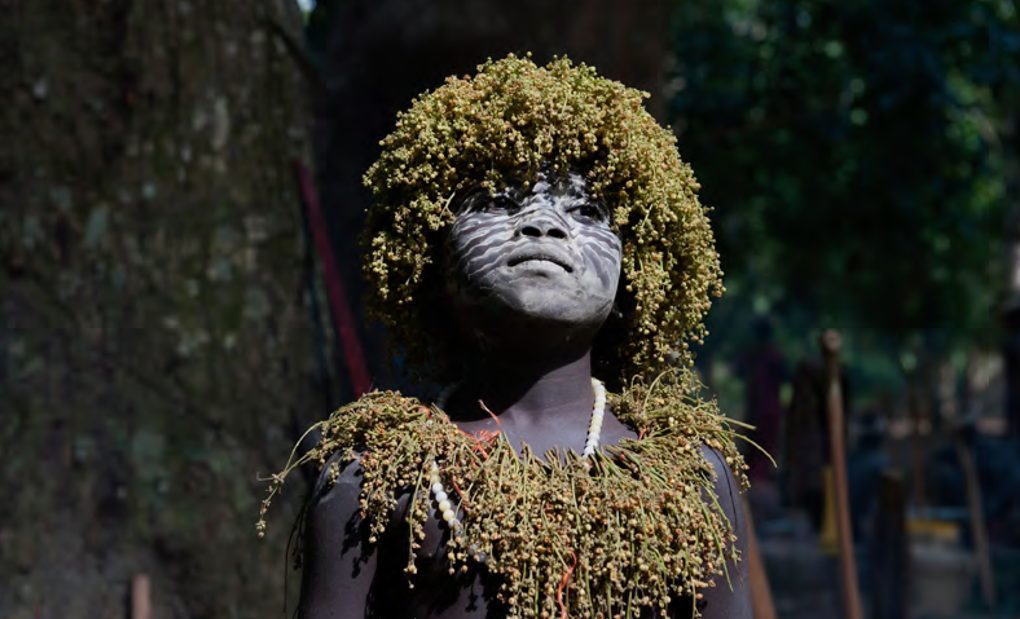
by Deep Green Resistance News Service | Jun 8, 2016 | Colonialism & Conquest
By Alexandre Dereims / Organic the Jarawas
Images copyright by Claire Beilvert
The Jarawa are hunters-gatherers. They have been living on the Indian Andaman Islands for thousands and thousands of years. According to recent studies, they are believed to have taken part in the very first human migrations from Africa to the rest of the world, some 70,000 years ago. And they first encountered Indian citizens only a decade ago. Since then, their situation has severely deteriorated. Women have been abducted and raped by Indians. The Jarawa have lodged several complaints to the Andaman authorities, to no avail.
The Jarawa are also victims of human safaris, organised by local tour operators. These safaris are taking place along the Andaman Truck Road, which was built illegally and cuts through the Jarawa’s territory. Dozens of vehicles, escorted by Indian armed forces, take it every day to photograph the Jarawa. Yet, it is forbidden to enter their territory, subject to prison sentences.
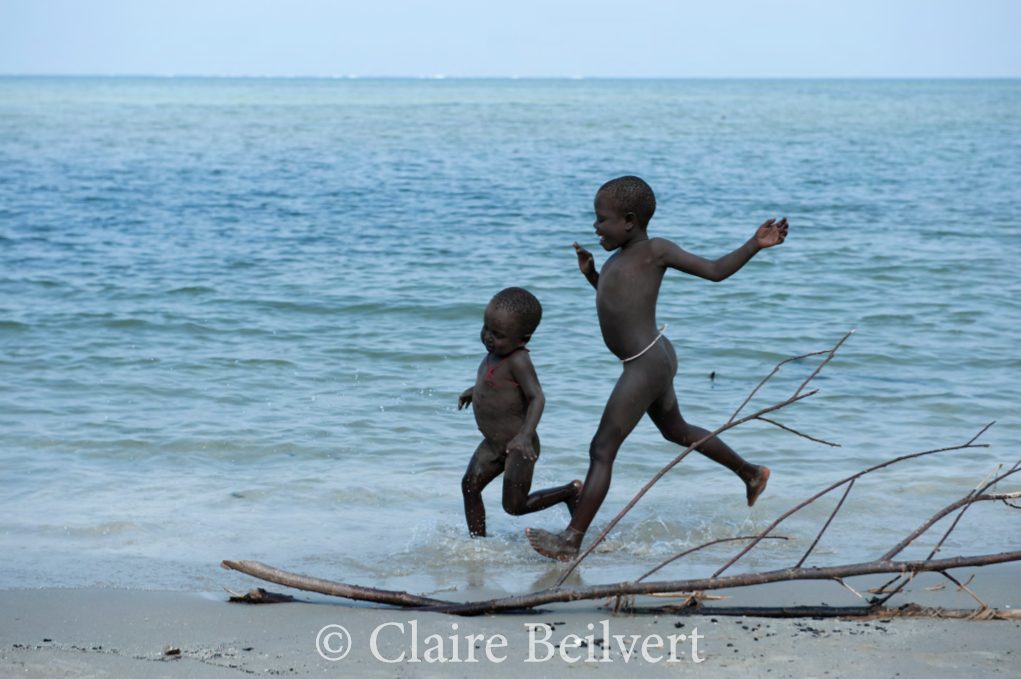
In 2013, Andaman MP Bishnu Pada Ray had even stated in the press that the Jarawa had expressed the desire to join the Indian community. But until now, no one has ever asked them if this was the case.
Alexandre Dereims, a French journalist, and Claire Beilvert, a French press photographer, succeeded in meeting them to ask them that question. They bypassed the ban on entering the reserve. They took every precaution to keep from transmitting diseases to them. The Jarawa allowed them to stay a few days with them to conduct interviews. For the very first time, members of this endangered people are speaking to the outside world.
They told them their story of their foreseeable disappearance, of forceful assimilation. Soon, the starving Jarawa will have no choice but to leave their territory and beg for food along the road. Journalists are sounding the alarm. New Delhi has recently decided to turn Port Blair, the capital city of the Andaman Islands, into the largest port on the Indian Ocean. The nationalist government led by Narendra Modi wants to enhance the tourism potential of these islands, which have become as popular as the Seychelles or the Maldives for the new Indian middle class. It is urgent to ponder about the survival of the most ancient people of Asia. The Indian government is already responsible for the disappearance of the Bo and the Onges, two others afro-asian people of the Andaman islands.
Journalists have launched an online petition to demand that the Indian government enforce the 2013 Supreme Court order to close the Andaman Truck Road. They also demand that the Jarawa’s territory be fully protected and that the AAJVS provide regular communication regarding the situation of the Jarawa people.
Link: http://bit.ly/savethejarawa
Website: http://www.organicthejarawa.com
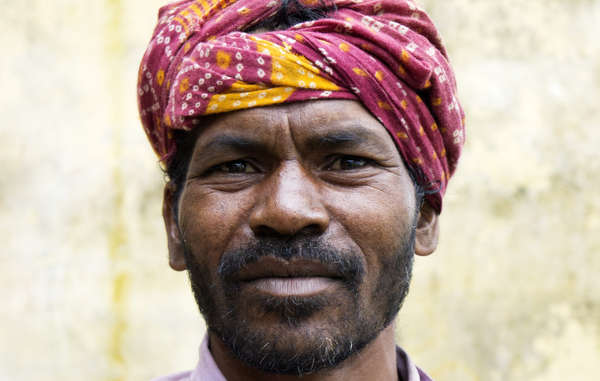
by Deep Green Resistance News Service | May 23, 2016 | Colonialism & Conquest
By Survival International
Featured image: Many Baiga have already been evicted from their forest homes, and now face lives of poverty in resettlement camps © Survival International
Several tribal villages in central India face annihilation as they are being forced to leave their ancestral land in Achanakmar tiger reserve, close to the area which inspired Rudyard Kipling’s Jungle Book.
The Baiga tribespeople have been repeatedly harassed and told that they will have to move from their villages to a muddy clearing outside the reserve, even though there is no evidence their presence in the reserve is harming tigers. Such evidence is required if the tribe’s eviction is to be lawful, but in fact the number of tigers in the reserve reportedly rose from 12 to 28 between 2011 and 2015.
One Baiga man from Rajak village said: “We don’t want to go, we can’t go. What should we do?”
A local witness told Survival: “There is nothing around the new site for them, nothing will grow in the land, there is no water and they won’t be able to take anything from the forest. That’s why they are so adamant that they won’t leave, because if they go they will just die out.”
Some have been told that if they don’t leave their ancestral land, guards will release bears and snakes into their villages. Others have been arrested and harassed – in 2009 one man was jailed for three months for eating a squirrel he had found dead on the forest floor.
Those who have already been evicted from Achanakmar now live in inadequate government camps and face lives of poverty on the fringes of mainstream Indian society.
One Baiga person from Chirahatta village, which is facing eviction, said: “They’ve been placing restrictions on us for two or three years. They don’t let us live. They take us to jail and threaten us. They are harsh and strict. They put us in jail for nothing. If we say anything they threaten to put us in jail. They are making it difficult for us to live.”
Elsewhere, Baiga people do back-breaking manual labour in bauxite mines in terrible working conditions.
Across India, tribespeople are being illegally evicted from tiger reserves, despite there being no evidence that their presence harms tigers. They face arrest and, in some places, beatings, torture and even summary execution for trying to re-enter their ancestral land, while large-scale tiger-spotting tourism is encouraged.
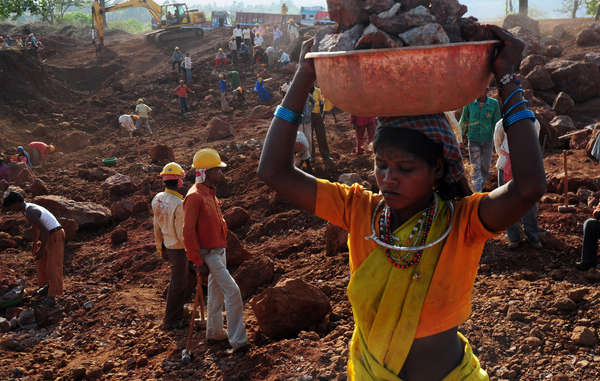
Baiga work in terrible conditions in the Bodai-Daldali bauxite mine, Chhattisgarh. Having once lived sustainable lives in the forests, they now endure exploitation and poverty after eviction from their land. © Sayantan Bera/Survival
Last year, Survival learned that tiger numbers had increased at well above the Indian national average in BRT, the one reserve in India where tribes have been formally allowed to stay on their land, demonstrating that tribal villages within wildlife reserves do not pose a substantial threat to tigers or their habitat.
Survival has written to WWF, the world’s largest conservation organization, which equips and trains the forest guards in the region.
Evidence proves that tribal peoples are better at looking after their environment than anyone else. Despite this, they are being illegally evicted from their ancestral homelands in the name of conservation. The big conservation organizations are guilty of supporting this. They never speak out against evictions.
Survival’s director Stephen Corry said: “It’s illegal and immoral to target tribes, who have coexisted with the tiger for centuries, when industrialization and mass-scale colonial-era hunting are the real reason the tiger became endangered. It’s also ineffective, because targeting tribespeople diverts action away from tackling the true poachers – criminal gangs. Big conservation organisations should be partnering with tribal peoples, not propping up the Forest Departments that are guilty of brutalizing them. Targeting tribal people harms conservation.”
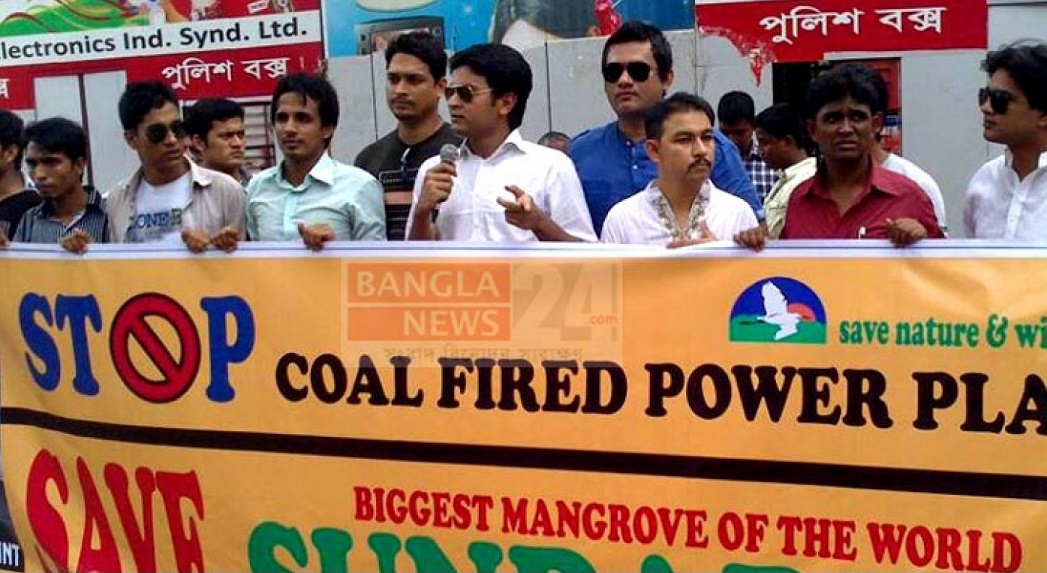
by Deep Green Resistance News Service | Apr 23, 2016 | Mining & Drilling, Repression at Home
By Cultural Survival
At least four people were killed after police opened fire at a massive protest of several thousand villagers in Bangladesh Monday, April 4th, reported the Phulbari Solidarity Group.
“This is a terrible tragedy and major news. It is the largest loss of life at an anti-coal protest in Bangladesh since the tragic deaths in the August 26, 2006 killings at Phulbari, Bangladesh, where three people were killed and 200 injured by paramilitaries. It is the worst overall loss of life in anti-coal protests worldwide since the killings of six people in Jharkhand, India, at two protests in April 2011,” noted Ted Nace, the editor of Coal Swarm.
Professor Anu Muhammd, the Member Secretary of the National Committee to Protect Oil, Gas, Mineral Resources, Power and Port in Bangladesh, noted: “The villagers in Bashkhali have been loud against the destructive plans of S. Alam Group for months because the company wants to build two coal-fired power plants in the area by evicting thousands of villagers and landowners. The coal-businessmen of S. Alam Group, financed by two Chinese firms — SEPCOIII Electric Power and HTG, were fully aware of the strong opposition to the coal-power plant.”
According to the Daily Star, in December 2013, S Alam Group, struck an agreement with SEPCO3 Electric Power Construction Corporation of China to set up a coal-fired power plant in Banshkhali district of Chittagong, Bangladesh. On February 16 this year, the government signed power purchase agreements with two private joint ventures led by S Alam Group to buy electricity at Tk 6.61 per kilowatt-hour from two projects with power generation capacity of 1,224MW. S Alam Group and their Chinese backers plan to initiate the power plant by November 2019 across a 600-acre site. No consultation has taken place with communities members who would be affected. The project will require an investment of $2.4 billion of which $1.75 billion will come from Chinese lenders.
Abu Ahmed was a witness to the police violence, himself being shot in his leg. He said that the villagers had been holding peaceful protests for days after S. Alam, the local conglomerate behind the project, started purchasing land for the plants in the village, which lies on the edge of the Bay of Bengal. But the government did not pay attention to the village protests and the district administration remained silent for months. This led the villagers to stage a mass protest which turned into the worst tragedy in the history of coal in Bangladesh. The government of Bangaldesh announced on April 9 that work at the $2.4 billion power plant would be suspended for 15 days, while it carries out an assessment of the plant’s environmental impact, led by Bangladeshi and foreign scientists.
The plans for coal mine join a laundry list of other planned coal projects being pursued by the government of Bangladesh and foreign investors, despite huge opposition from communities, international coalitions, human rights experts, and environmentalists. Phulbari coal project, in Northeastern Bangladesh, is one infamous case that has lead to massive protests over the 8 years since it was first proposed by GCM resources, a British-based company. Ongoing mobilizations by communities on the ground have been successful in preventing the licensing of the coal mine, and resulted in plummeting financial loss for GCM, who failed to conduct adequate social and environmental impact studies and gain the free, prior, informed consent of the communities at various stages of the project’s life.
As a rapidly developing country, Bangaldesh has a strong demand for electricity, but communities are not willing to accept development at the cost of losing their lands and livelihoods.
In an op-ed in the Dhaka Tribune, Professor Muhammed argued, “Tension and resistance will be certainties if a so-called development projects like this are implemented forcefully and through fraudulent activities and corruption. People will not accept any project that goes against the locals’ interests or may harm the national interests or is taken up without maintaining transparency.”
Bangladesh has made plans to ramp up its coal production, with the goal of setting up 25 coal-fired power plants by 2022. However this lies in conflict with its goals to curb carbon emissions in line with the climate treaty negotiations agreed to in Paris in 2015 known was the COP 21 agreement, to limit global temperature rise to 2 degrees Celsius.
An analysis by the Climate Action Tracker presented at the COP 21 found that attempts to keep global warming to 2 degrees will be wildly off course if existing plans for coal-fire plants are carried out, as coal is the world’s single biggest contributor to global warming. Just by allowing the 2,440 coal-fired power stations that are currently planned would cause emissions rates four times higher than the 2-degree target by 2030. Without a single new coal plant, allowing existing coal plants to continue operating would lead to emissions rates 150 percent higher than what is consistent with a 2-degree target.
Bangladesh was part of a coalition of developing countries who argued for rich countries, who carry more responsibility for climate change, to carry more of the financial burden that developing countries would incur in order to leapfrog past dirty fossil fuels like coal.
Read more: After the COP21: How Bangladesh Can Move Past Coal and Why Rich Countries Must Help








